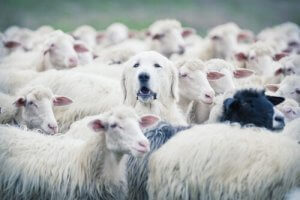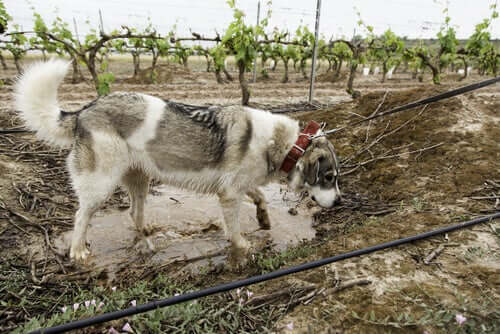The Mastiff's Guardian Instinct


Written and verified by the vet Eugenio Fernández Suárez
A guardian instinct is one of the most important characteristics for dogs that protect livestock, particularly mastiffs. Mastiffs are a group of breeds that belong to the mountain molossers. They’re ideal for herding livestock or even protecting them from threats.
Guardian instinct: breed and suitability
Certain breeds are more suitable for specific tasks than others. This is because particular characteristics have been carefully chosen when breeding them, such as in the case of the Leonese or Pyrenean mastiff. As a result, when looking for a dog to work with livestock, you’ll want a dog with an inherently strong guardian instinct.
Some mastiffs have been bred to meet certain aesthetic qualities. However, this has meant that they’re not necessarily suitable for protecting livestock, whether it be because of their behavior or physique.
As a result, we can differentiate between different types of mastiff. On the one hand, we have the native mastiffs of each region, which have co-evolved with livestock for centuries. They’ve been used as guard dogs practically since the beginning of farming, thousands of years ago. They’re adapted to the environment, its predators, and the herd itself.
On the other hand, we have the more ornamental breeds, which have preserved their mastiff appearance but have lost their guardian instinct. One clear example of this is the Office Spanish Mastiff. They have a prominent dewlap and can have mobility problems, making them quite unsuitable for protecting livestock.

The ideal mastiffs for working with livestock depend on the type of animals and region. In general, there has been extensive farming in every region for a long time, and as a result, there are suitable dog breeds for protecting livestock.
The guardian instinct: how they’re raised is also important
As well as their genetics, mastiff puppies also need to be raised with livestock. This helps to develop their guardian instinct by helping them to see the livestock as part of their family.
Socialization is a vital part of this. Some of their relationship with humans loses importance in order to build a strong bond with the sheep, cows, or other animals.

Through this process, the mastiff becomes part of the herd and acquires a tenacious guardian instinct. This will make them ideal to respond to any threat regardless of the time of day or the terrain.
Mastiff behavior
Any dog used for this purpose needs to be completely emotionally stable. They can’t be too playful nor too aggressive. But they need to be attentive to the livestock and particularly active at night when predators are more likely to attack.
As we’ve already mentioned, bonds with humans aren’t a priority. Despite their important function, their guardian instinct isn’t down to training. This said, it’s possible to correct undesired habits such as the excessive use of force or aggression in play.
Some people believe that mastiffs are the main way of resolving the conflict between farmers and predators. A good number of mastiffs seems to be effective in preventing attacks, especially when supported by other measures such as breeding pens or barriers.
However, despite their great utility and effectiveness, mastiffs are quite expensive to keep. This is where all of society comes in. By buying local products, you can help farmers to maintain their mastiffs.
This text is provided for informational purposes only and does not replace consultation with a professional. If in doubt, consult your specialist.